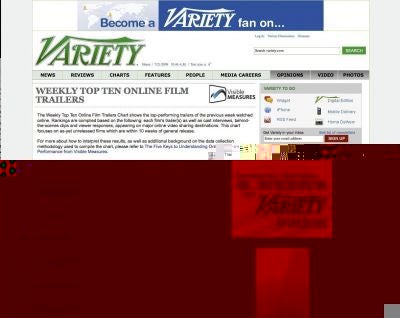Variety to begin building 'pay wall' around website

As struggling US newspaper and magazine publishers look for ways to make money online, Hollywood trade journal Variety has announced plans to begin erecting a "pay wall" around its website.
Variety, in a statement on Wednesday, said print and digital subscribers will get full access to all of the content on Variety.com, but starting on Thursday it will take steps to begin charging readers online.
The entertainment industry magazine said that after clicking on two pages of content at Variety.com, one in 10 randomly selected visitors will be prompted to register for further access.
It said nonsubscribers will eventually be able to access only five pages of content in a given month.
"This initial phase allows us to gather more information about our paying customers worldwide and hone the user experience so we can continue to provide the best subscriber experience for all paying customers," Variety president Neil Stiles said.
"The number of unique visitors to Variety will decline, but the people who remain on the site are our core audience," Stiles said. "These are ultimately the people we want to reach."
Variety, which is owned by the Reed Elsevier Group, said the Variety.com home page, headlines, brief article summaries and search results would not be affected by the eventual pay wall.
US newspaper and magazine publishers are grappling with declining print advertising revenue, falling circulation and free news on the Internet and many are debating whether to start charging readers on the Web.
The Wall Street Journal is currently the only major US newspaper charging online readers but News Corp. chairman Rupert Murdoch has announced plans to erect pay walls around all of his newspapers.
Many newspapers have been hesitant about making such a move, however, fearing it would drive readers to free sites and cut into their online advertising revenue.
Subscribe to Independent Premium to bookmark this article
Want to bookmark your favourite articles and stories to read or reference later? Start your Independent Premium subscription today.

Join our commenting forum
Join thought-provoking conversations, follow other Independent readers and see their replies